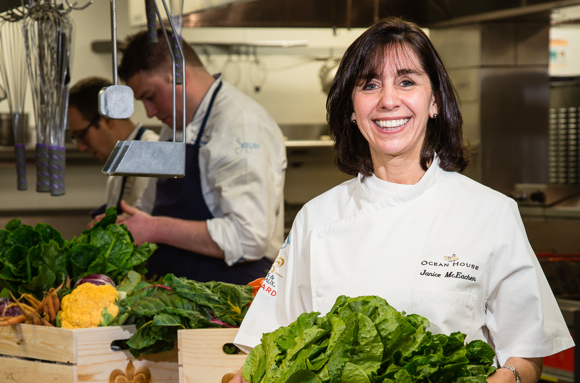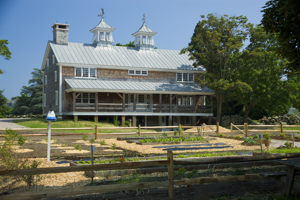Despite starting out in corporate sales, Janice McEachen’s passion is food. With a résumé that includes serving as a personal chef and doing business development for a shellfish company, last fall McEachen took over as “food forager” at the Ocean House in Watch Hill, Rhode Island, a 49-room property that dates back to the 1870s.
HOTELS spoke with McEachen about her role at the Ocean House and how the resort’s farm-to-table approach for its five dining outlets is continually evolving.

HOTELS: What are your main job responsibilities as the property’s food forager, and what might a typical day look like for you?
Janice McEachen: My job is twofold — I’m the food forager and director of culinary education, so I weave a little of both into each day. For example, this morning, I had to pick up greens. I met with somebody who provides Bibb lettuce for us, and he showed me some things he’s growing now that we hadn’t purchased from him before. Then I went over to another greenhouse and picked up some baby greens. I also spoke with a new organization here in Rhode Island growing mushrooms; I talked with them this morning about maybe bringing some of their mushrooms to the Ocean House.
A lot of it is facilitating getting the product here. As a chef, you don’t have time to drive around everyday and pick things up, and as a farmer you can’t get all over the state everyday. It’s a lot of coordination between the different farms and our chefs.
HOTELS: How much do you work with chefs to source ingredients they want locally, or do they usually work with whatever high-quality ingredients you find locally?
McEachen: It definitely works both ways. With the mushrooms, I will go into the kitchen with a list and go over it. Obviously, they’re going to cost a little more than getting mushrooms through a distributor, but we prefer to support that local business, and it will be super-fresh, nice local product for us to use.
HOTELS: Can you charge a higher menu price for a local product?
McEachen: Not always, but it’s worth it to us to be able to support these local farms.
HOTELS: What is the best part of your job as food forager?
McEachen: The whole thing — I have a great job. Working with farms — I really enjoy meeting the people who are producing the food. Being a person who loves food and is fascinated with the dishes our chefs put together, it’s really fun to come back with a handful of mushrooms and see what amazing things the chefs do with them.
HOTELS: What is the hardest thing you have to cope with?
McEachen: The biggest challenge is sourcing — not always being able to get as much as I want of something. We find something, we love it, we get it for two weeks and all of a sudden there’s not enough.
There’s always backup. There’s a larger farm in Massachusetts that I can go to to fill in what the smaller farms can’t make up. There’s always a way to work it, but it gets a bit challenging sometimes, and I see that happening more in the summer.
HOTELS: Why do you believe local sourcing in general is such a popular trend now?
McEachen: I think people are realizing to buy a head of lettuce that got shipped across the country doesn’t make sense when you can just go the farmers market and buy one that was grown right down the street.
I think this is the way it should be. People talk about this being a movement or a phase; I don’t think it’s a phase. I think we’re getting back to the way it used to be. If you talk to some of the older farmers, they’re amused sometimes at people thinking this is a trend, because it’s not something new. It’s the way we used to be, and hopefully that will continue.
HOTELS: What do you predict for the future of the overall local sourcing movement? What will be the next level of “farm to table”?

McEachen: We’re growing some things ourselves now. We just put in four beehives, so we’re going to have our own honey soon. We’re going to get some chickens, so we’ll start having our own eggs. A lot of people are doing this, and maybe the next step is to start growing more ourselves.
Another element is getting to the point where there is less imported and more available nearby, and therefore farms are being supported enough to expand. Maybe we’ll get to the point where larger properties can buy locally because the farms are being supported well enough that they can grow enough to support these larger companies as well.
HOTELS: If local producers were to get larger, though, would that take away some of the appeal of their product?
McEachen: I wouldn’t want them to get to be huge in that you lose that personal touch, but to get to the point where they’re making a more viable income and can support some bigger restaurants, that would be great.
